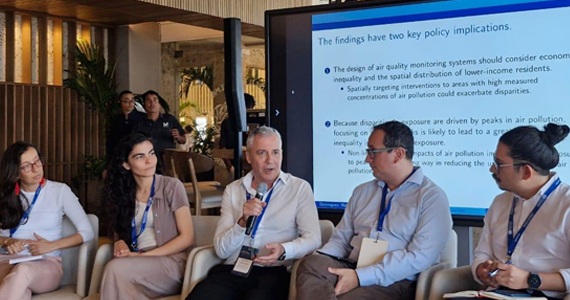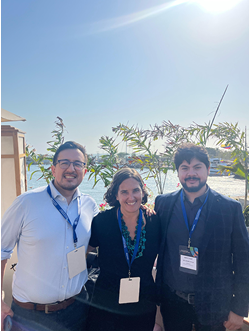SALURBAL-Climate at the WHO Second World Conference on Air Pollution and Health
PHILADELPHIA, PA,
July 9, 2025
Reading time: 4 min
Seven members of the SALURBAL-Climate team participated in the Second World Conference on Air Pollution and Health from March 24 to 28, 2025, engaging in workshops, co-creation, and expert panels. The event, led by the World Health Organization (WHO) and the Colombian Ministry of Health, convened over 700 participants from 100 countries who came together in Cartagena, Colombia.
Attendees included key stakeholders from the public sector, such as ministries of health, environment, and energy, as well as representatives from the private sector, civil society, and academia. The conference aimed to accelerate action for clean air and energy while discussing solutions that integrate climate mitigation.
The SALURBAL-Climate team shared key findings from eight years of research developed as part of the SALURBAL initiative, which seeks to strengthen the evidence base on the determinants of urban health across the region and respond to policymakers' needs.
"The international visibility of SALURBAL-Climate at such a significant event not only strengthens the project’s prominence but also creates strategic opportunities to expand its impact," emphasized Olga Lucía Sarmiento, Co-Principal Investigator of the project and professor at the Department of Public Health, at Universidad de los Andes, who attended the conference. "Scientific evidence helps promote context-specific solutions for our region, that can serve as global examples."
 Nelson Gouveia, Principal Investigator of the Brazil team at SALURBAL-Climate and professor at the University of São Paulo, presenting the project.
Nelson Gouveia, Principal Investigator of the Brazil team at SALURBAL-Climate and professor at the University of São Paulo, presenting the project.
SALURBAL’s participation included:
Olga Lucía Sarmiento and Astrid Herrera (Postdoctoral Assistant) represented the project at the Pan American Health Organization (PAHO) action plan meeting. They were also panelists at the 2nd International Symposium: Solutions for Climate Change, Air Quality, and Public Health, co-organized by SALURBAL-Climate.
Nelson Gouveia, Principal Investigator of SALURBAL-Climate in the Brazilian team and professor at the University of São Paulo, presented the project at two events:
- Research and Public Policy: Inequality and Air Pollution in Latin American Cities, organized by the Inter-American Development Bank.
- Promoting Collaboration in the Global South for Air Quality, coordinated by the Health Effects Institute, which brought together experts to exchange strategies and share success stories in achieving clean air in the Global South.
Reflecting on his participation, Nelson Gouveia noted: "Attending the Cartagena Conference was a great experience. It wasn’t just a scientific discussion on methodologies—it was a space to connect with global leaders, policymakers, and researchers focused on tackling air pollution and its health impacts."
 Three of the researchers—Serena Perner, Samuel David Osorio García, and Salvador Ayala Pizarro—joined the Emerging Leaders for Clean Air Forum (ELCAF), organized by Global Youth Strategy (GYS), Emory University, and the Colorado School of Public Health. This side event gathered early-career researchers and young leaders.
Three of the researchers—Serena Perner, Samuel David Osorio García, and Salvador Ayala Pizarro—joined the Emerging Leaders for Clean Air Forum (ELCAF), organized by Global Youth Strategy (GYS), Emory University, and the Colorado School of Public Health. This side event gathered early-career researchers and young leaders.
SALURBAL-Climate also participated in the discussion Differential Impacts of Air Pollution on Human Rights, organized by Las Marías al Aire, the Inter-American Association for Environmental Defense (AIDA), and the Latin American Coalition for Clean Air. Samuel Osorio represented the project, addressing the unequal effects of the climate crisis and the importance of incorporating these considerations into air quality policies in the region.
2nd International Symposium: Solutions for Climate Change, Air Quality, and Public Health

The event brought together 60 in-person and 17 virtual attendees. As a panelist, Olga Lucia Sarmiento presented the evidence provided by SALURBAL on air pollution in urban areas of the region, showing that concentrations of particulate matter of 2.5 microns and nitrogen dioxide exceed the recommendations of the WHO air quality guidelines and drive negative health impacts across the region.
Beyond direct health risks, air pollution and climate change are putting greater strain on health systems and damaging local economies. Opportunities to address this challenge include improving monitoring systems and adopting comprehensive clean air policies. Implementing these measures would not only lessen health impacts but also support more sustainable and resilient development.
SALURBAL-Climate is financed by the Wellcome Trust 227810/Z/23/Z
Contact: Carolina Rendón, Communications Specialist - cr3283@drexel.edu